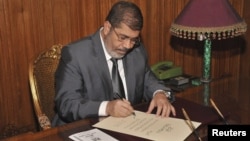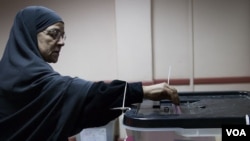CAIRO, EGYPT —
In an address on national TV Wednesday, Egyptian President Mohamed Morsi congratulated Egyptians for voting to approve a new constitution and urged them to unite and work toward a better future. The address came one day after he signed the controversial new constitution into law.
Morsi says that by approving the constitution, Egypt was moving from its “First Republic,” to a new “Second Republic.” Without mentioning the outcry and protests over how the constitution was passed, Morsi thanked those who participated in what he called a free and fair referendum.
He said the Egyptian people chose to approve the constitution by free will and under conditions of transparency, complete judicial supervision, and protection by the army.
Opposition charges
Opposition leaders claim that the vote was tainted by numerous irregularities and fraud. Egypt's electoral commission, however, dismissed most of those charges Tuesday.
Morsi said he has no “desire to cling to power” and that legislative authority has now been transferred to the Shoura Council, the upper house of the Egyptian parliament. Morsi said he has made mistakes, but that his decisions were “made before God and in the interests of the nation.”
The president said Egypt is facing serious economic difficulties and called on his countrymen to “work hard and increase production.” He repeated a call for national dialogue.
The Shoura Council met Wednesday to consider various pieces of legislation after the new constitution gave it legislative power, pending the election of a new lower house in two months. Among that legislation is a bill restricting financial dealings.
Minister of State for Parliamentary Affairs Mohamed Mahsoub told the council that the bill should be approved quickly to prevent the flight of capital and speculation:
He said urgent legislation is needed to fight corruption and recover stolen money, along with a law to prevent speculation and stop those trying to sabotage state companies.
Economy falters
Egypt's council of ministers met Wednesday to discuss the economic crisis facing the country. The new constitution did little to resolve that crisis, say many analysts, but appeared instead to intensify it.
Said Sadek, who teaches political sociology at the American University in Cairo, said that Egypt's political opposition appears to have decided not to mount major protests over the constitution and will instead wait for the economic crisis to fuel further protests:
“The battle of the constitution is over, but other battles are coming. A lot of people from the revolution opposition believe that the government has mishandled the political situation and when those who voted for this constitution realize that what they got is more taxation and more economic hardship, you'll have a bigger pool of opposition,” said Sadek.
A $4.8-billion loan from the International Monetary Fund was delayed amid Egypt's ongoing political crisis.
Ratings agency Standard and Poor's downgraded the country's long-term credit rating on Monday. Ahram Online reported that Egypt is now preventing travelers from taking more than $10,000 out of the country.
Morsi says that by approving the constitution, Egypt was moving from its “First Republic,” to a new “Second Republic.” Without mentioning the outcry and protests over how the constitution was passed, Morsi thanked those who participated in what he called a free and fair referendum.
He said the Egyptian people chose to approve the constitution by free will and under conditions of transparency, complete judicial supervision, and protection by the army.
Opposition charges
Opposition leaders claim that the vote was tainted by numerous irregularities and fraud. Egypt's electoral commission, however, dismissed most of those charges Tuesday.
Developments in Egypt
Developments in Egypt- Nov. 22: Presidential decree gives Mohamed Morsi sweeping powers, protests erupt
- Nov. 30: Islamist-controlled assembly adopts draft constitution
- Dec. 1: Constitution referendum scheduled for December 15
- Dec. 2: Judges say they will boycott constitution referendum
- Dec. 5: Protesters clash outside presidential palace in Cairo
- Dec. 8: Morsi annuls presidential decree
- Dec. 10: Morsi gives military authority to arrest civilians
- Dec. 15/22: Egyptians vote on constitutional referendum
The president said Egypt is facing serious economic difficulties and called on his countrymen to “work hard and increase production.” He repeated a call for national dialogue.
The Shoura Council met Wednesday to consider various pieces of legislation after the new constitution gave it legislative power, pending the election of a new lower house in two months. Among that legislation is a bill restricting financial dealings.
Minister of State for Parliamentary Affairs Mohamed Mahsoub told the council that the bill should be approved quickly to prevent the flight of capital and speculation:
He said urgent legislation is needed to fight corruption and recover stolen money, along with a law to prevent speculation and stop those trying to sabotage state companies.
Economy falters
Egypt's council of ministers met Wednesday to discuss the economic crisis facing the country. The new constitution did little to resolve that crisis, say many analysts, but appeared instead to intensify it.
Said Sadek, who teaches political sociology at the American University in Cairo, said that Egypt's political opposition appears to have decided not to mount major protests over the constitution and will instead wait for the economic crisis to fuel further protests:
“The battle of the constitution is over, but other battles are coming. A lot of people from the revolution opposition believe that the government has mishandled the political situation and when those who voted for this constitution realize that what they got is more taxation and more economic hardship, you'll have a bigger pool of opposition,” said Sadek.
A $4.8-billion loan from the International Monetary Fund was delayed amid Egypt's ongoing political crisis.
Ratings agency Standard and Poor's downgraded the country's long-term credit rating on Monday. Ahram Online reported that Egypt is now preventing travelers from taking more than $10,000 out of the country.





